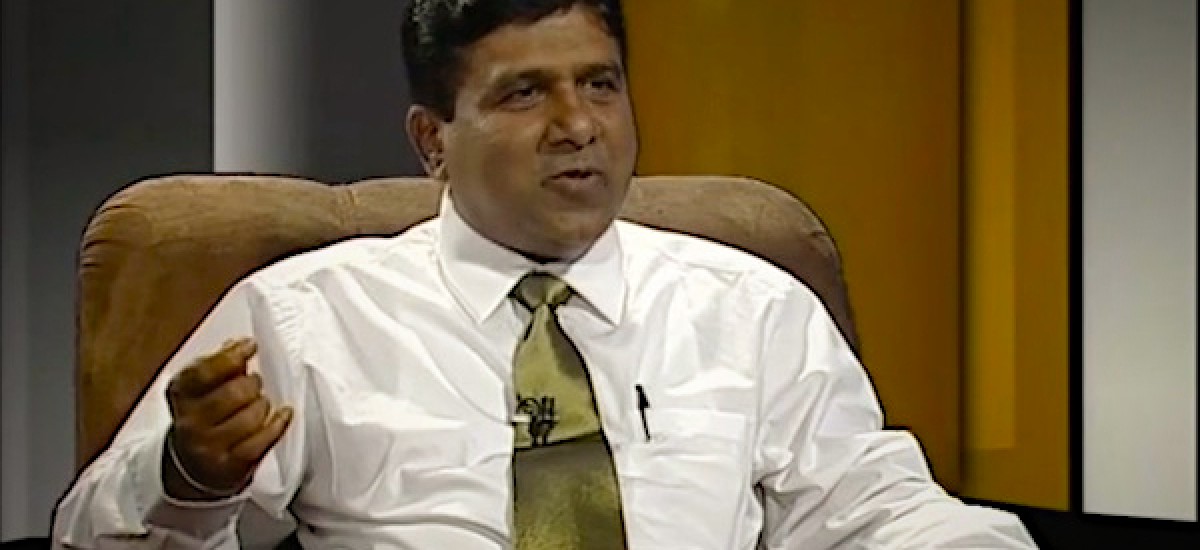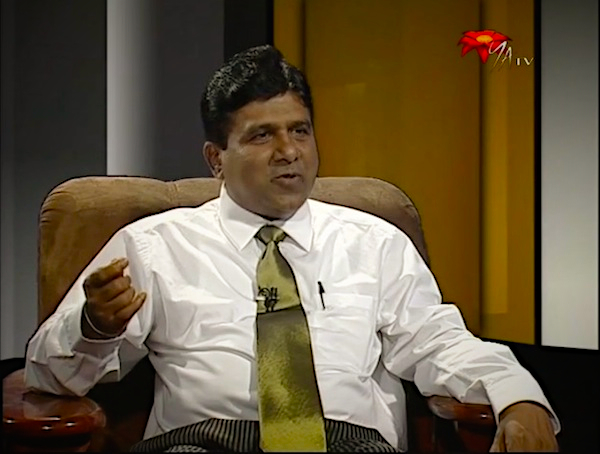Wijeyadasa Rajapakshe, President’s Counsel, is a Member of Parliament from the United National Party, and currently President of the Bar Association of Sri Lanka. In the past, Mr. Rajapakshe’s also chaired the Committee on Public Enterprises.
No stranger to being in the headlines, Mr. Rajapakshe in late May tabled Private Member’s Bill in Parliament asking that Sri Lanka’s Constitution be amended to prevent a priest of any religion becoming a member of Sri Lanka’s legislature. As noted in the media at the time, Mr. Rajapakshe said he had decided to bring this amendment for the purpose of maintaining and preserving religious dignity and holiness of all religions.
As expected, all hell broke loose. At the time of our conversation, the Jathika Hela Urumaya (JHU) emerged as one of the most strident opponents of the proposed bill, vowing to defeat it if and when tabled in Parliament and asserting that Western conspirators are behind the proposal. As noted in the media, JHU Western Provincial Minister of Agriculture and Irrigation Udaya Gammanpila had in response to the bill noted that religious leaders are better qualified to be political candidates and people’s representatives and that politicians have no right to decide whether priests should engage in politics or not, which is at the sole decision of religious institutions. A month after, the bill was still being discussed within the UNP, or so media reports said.
Aside from the JHU, there were some voices of support from the Buddhist clergy towards the proposed bill. One media report features a voice cut of the Chancellor of the Kelaniya University Dr. Walamitiyawe Kusala Dhamma Thero who states that recommendations provided by the Commission for Buddha Sasana (which came about after wide consultations with the sangha) disapproves of Buddhist clergy engaging in politics. The Catholic Council’s National Director for Social Communication Father Benedict Joseph also dubbed the bill as judicious.
Also extremely interesting is the fact that in online fora, the comments voted up by readers in open discussions of the bill are very much in favour of it.
However, this support aside, the passage of the bill in Parliament took a definitive turn in early July, when media reports noted the President had informed the parties of his ruling coalition to vote against the proposed bill following a discussion with the Buddhist party, Jathika Hela Urumaya (JHU).
In this conversation, Mr. Rajapakshe re-affirms that he will table the bill in Parliament. Given the strong opposition led by the JHU and the Presidential edict, it’s hard to see how it will succeed.
We begin our conversation with Mr. Rajapakshe clarifying why he introduced the bill, when it could be argued that more not less clergy in the legislature could lead to better lawmaking and debate. Mr. Rajapakshe flags the disconnect between the initial hopes of the people when monks first entered Parliament, and what their representation and actions have really come to be and mean. He also goes on to answer the JHU’s charge that no lay-person can make laws that bind the clergy’s engagement in mainstream politics. He also goes on to clarify that the bill does not intend to strip monks of their civic rights or their right to engage with national politics, and that it only aims to prevent them from being part of party politics.
Speaking of the confusing and contentious party political divisions within the sangha today, Mr. Rajapakshe avers that the bill aims to enhance, not dilute, the status of the sangha as advisors to the rulers of the country, in line with their role for centuries.
When Mr. Rajapakshe is asked how successful he thinks the bill’s progress in Parliament would be, especially given the Executive’s public opposition to it and orders to vote against it, he says that the Executive’s opposition is precisely the response he wanted to engender in order to demonstrate how corrupt the present political architecture is. He also comes out very strongly against the JHU – noting that democratic norms and due process have been destroyed by the party.
Mr. Rajapakshe also notes a fact that has gone, to the best of our knowledge, entirely unreported in recent media reports on the bill – that the process by which the current bill was arrived at actually consulted, and received the blessings of the Chief Prelates of all the four main Nikāyas in Sri Lanka. In addition, he submits that what is noted in the current bill was actually presented to the Executive as way back as August 2011 by the Asgiriya Mahanayake Thero. He then answers a question as to why there is so much controversy around his bill at the moment.
After noting that post-war “monks are now an obstruction to reconciliation” Mr. Rajapakshe goes briefly into the political history of Sri Lanka and how the SLFP and SWRD Bandaranaike, decades ago, had also used the sangha for party political gain, before it all went very sour.
Towards the end of the interview, we talk about the growing religious intolerance in Sri Lanka, and in particular, the Buddhist monk led mobs in Dambulla that attacked a mosque in late April. Mr. Rajapakshe answers whether aside from his own bill and the debates it has engendered, there should be discussion within the sangha itself on the systemic decay that has eroded it’s character for decades. We end by talking about the future of secularism in Sri Lanka, and how Mr. Rajapakshe sees the future of his private member’s bill influencing policies and practices towards a more tolerant, harmonious country.
Wijeyadasa Rajapakshe M.P. from Young Asia Television on Vimeo.


